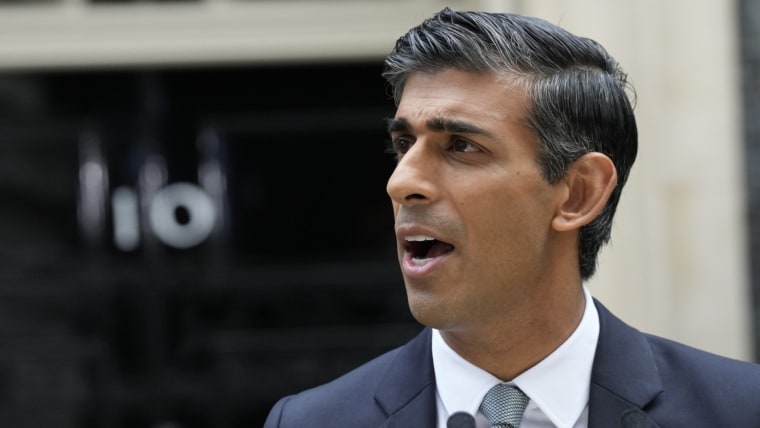LONDON — Seventy-five years after Louis Mountbatten became the last Brit to rule over India, Rishi Sunak, a descendent of Indian immigrants, has walked into Downing Street as the first South Asian British prime minister. Although it is clearly a historic achievement, we should not be fooled into thinking this is a milestone for the U.K.’s minority communities. Sunak, and the ruling Conservative Party he now heads, have been no champions of minority communities like mine.
The achievement just underscores what I’ve always felt: Only by conforming to the demands of the pre-existing establishment will race or color no longer matter in Britain.
The third prime minister in only two months, Sunak has been handed the gauntlet of running a country in political and economic turmoil after the disastrous premierships of Liz Truss and Boris Johnson. With a background as a hedge fund manager, he comes into the job with a couple of years of experience as chancellor of the exchequer, the British equivalent of the secretary of the treasury, and several years as a member of Parliament. Before we praise him as the first British person of color to be leader of the nation, we must acknowledge his previous policies have hurt those very populations and his current ones are on track to do no better.
Sunak pointed to his pride in being an immigrant in such a country of opportunity in an early campaign video. It is a welcome sight, as a child of immigrants from Iraq — also a former British colony — to witness the landmark moment of having the first Hindu lead the country, especially after Johnson compared Muslim women to “bankrobbers” and “letterboxes.” But the achievement just underscores what I’ve always felt: Only by conforming to the demands of the pre-existing establishment will race or color no longer matter in Britain.
Just as the election of President Barack Obama was not a harbinger of a post-racial America, having a person of color sit in the highest political office in Britain does not mean we are witnessing the end of racism. In fact, such a politician can often exacerbate racism by implementing harsher policies against their own communities.
Historically, the British would generally select those most assimilating to white culture to be in positions of power above the other locals in their colonies. Often, those natives would then conduct heinous crimes, maybe in hopes of proving their worth to their white superiors. The Indian farmers complicit in the Bengali famine of 1943 are an example.
Today, Sunak and other Conservative Party MPs from minority backgrounds — perhaps in a misguided effort to seek wider validation and appeal to xenophobic followers within the party — have pushed for some of the most racist policies in recent history. While it’s a positive development to see representation in senior politics, this inclusivity should not be contingent on deracinating self-abnegation.
Despite the persistent austerity program of the Conservative government, Sunak managed to push through hundreds of millions of pounds of anti-immigration funds during his time as chancellor. He was part of a government that attempted to implement one of the most racist policies to date, the Nationality and Borders Bill. The legislation included a clause (since removed) that would have allowed the British government, in the name of national security, to revoke without warning the citizenship of anyone it deems has a claim to another nationality.
It is ironic that this is the same political party that unilaterally announced Britain is no longer structurally racist. The Commission on Race and Ethnic Disparities, set up by the government in the wake of Black Lives Matter protests, concluded in March 2021 that Britain is not “rigged against ethnic minorities.” But racial disparities in housing, health care, education, policing and others still exist, and denying them is problematic.
Since running for prime minister, Sunak has also vowed to implement a variety of anti-immigration policies that would see the “chance of a better future” he received not extended to others. One scheme called for those seeking asylum in the U.K. to be shipped off to Rwanda. “It is essential that anyone considering trying to sneak into Britain knows that their journey will end in Kigali, not King’s Cross,” Sunak said in a campaign video. In another inhumane plan, Sunak proposed accommodating migrants on ships as opposed to hotels while their asylum applications were processed.
The former chancellor of the exchequer’s economic policies have been no better. Brits from Black and minority ethnic backgrounds have at times been assessed as twice as likely to be among those hardest hit from the Conservative Party’s austerity measures. One report found that the policies have been assessed to have a “disproportionately negative impact” on “certain ethnic groups” by adding layers of taxes unequally affecting communities, a practice Sunak has shown no signs of reversing.
Of course, any cuts in public spending would not affect him. Sunak comes into 10 Downing St. as one of the richest people in Britain, with a net worth over £700 million. From not knowing how to use a credit card to struggling to pay at a gas pump, Sunak has shown his privilege throughout his career in public service. He once famously noted that he didn’t have “working-class friends“ and in another instance proudly announced diverting funds from “deprived urban areas” to more affluent parts of Britain. Yet it is people of color who make up much of the working-class population that Sunak avoids associating with.
Sunak’s policies show that what matters isn’t the skin color of the person in power, but the discrimination that he or she imposes. Although politicians like Sunak come from immigrant communities, their policies have been to those communities’ detriment. Only when politicians’ policies unashamedly support diverse populations can we truly celebrate these leaders’ own diversity.
Source: | This article originally belongs to Nbcnews.com











